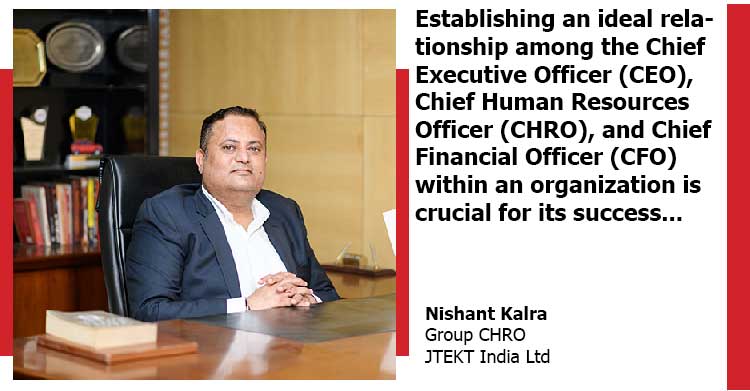Clear and open communication – Key to fostering a harmonious relationship among the CEO, CHRO, and CFO | Nishant Kalra | Group CHRO | JTEKT India Ltd

Establishing an ideal relationship among the Chief Executive Officer (CEO), Chief Human Resources Officer (CHRO), and Chief Financial Officer (CFO) within an organization is crucial for its success. Each of these roles plays a distinct yet interconnected part in shaping the company’s strategy, culture, and financial decisions. There is a significance importance of their collaboration that should exist among them to drive organizational effectiveness and growth.
The CEO, as the top executive, holds the responsibility of setting the company’s overall direction, vision, and goals. They are accountable for the organization’s performance and ensuring that all activities align with the strategic objectives. The CEO is often the face of the company, representing it to the stakeholders, investors, and the public.
The CHRO focuses on managing the organization’s human capital. This involves overseeing talent acquisition along with employer branding, retention, employee development, organizational culture, and employee relations. The CHRO plays a critical role in shaping the company’s culture, ensuring alignment with its values and goals & also ensure alignment of HR Policies/initiatives with employees needs by keeping balance with business needs.
The CFO is responsible for the company’s financial health. They manage financial planning, budgeting, reporting, and risk management to ensure the organization’s long-term financial stability and growth.
For an organization to thrive, it is essential that the CEO, CHRO, and CFO work collaboratively and cohesively. Their interactions must be characterized by open communication, mutual respect, and a shared commitment to the company’s success. The ideal relationships among these key executives are summarised below:
1. Strategic Alignment: The CEO, CHRO, and CFO should be aligned on the organization’s strategic priorities and goals. The CEO sets the strategic direction, the CHRO ensures that the workforce is equipped/encouraged to execute the strategy, and the CFO provides the financial resources and insights to support strategic initiatives.
2. Trust and Collaboration: Trust is fundamental in any relationship, especially among top executives. The CEO should trust the CHRO to build a high-performing and engaged workforce, while the CFO should trust the CHRO to provide accurate data and insights on human capital issues & financial constraints. Similarly, the CHRO should trust the CFO to make sound financial decisions that support the organization’s people strategy.
3. Data-Driven Decision Making: The CHRO and CFO can collaborate on utilizing data analytics to inform strategic decisions. By combining workforce data with financial data, they can uncover insights that drive business performance and enhance overall organizational effectiveness.
4. Cross-Functional Understanding: It is essential for the CEO, CHRO, and CFO to have a basic understanding of each other’s roles and responsibilities. This cross-functional knowledge promotes empathy, facilitates collaboration, and allows for a broader perspective when making decisions that impact the entire organization.
5. Communication and Transparency: Clear and open communication is key to fostering a harmonious relationship among the CEO, CHRO, and CFO. Regular meetings, updates, and sharing of information ensure that everyone is on the same page and working towards common objectives.
6. Conflict Resolution: Conflicts may arise in any relationship, including among top executives. It is vital for the CEO to facilitate constructive conflict resolution and create an environment where differing opinions and perspectives are valued in the interest of the organization & its decisions.
7. Continuous Learning and Development: The CEO, CHRO, and CFO should continuously invest in their personal and professional development to stay abreast of industry trends, best practices, and emerging technologies. Learning together can strengthen their relationship and enhance their collective impact on the organization.
In conclusion, the ideal relationships among the CEO, CHRO, and CFO are built on mutual trust, strategic alignment, collaboration, data-driven decision making, communication, and continuous learning. When these key executives work together effectively, they can drive organizational success, foster innovation, and create a culture of excellence. By prioritizing a strong partnership among the CEO, CHRO, and CFO, organizations can achieve sustainable growth and competitive advantage in today’s dynamic business environment.


